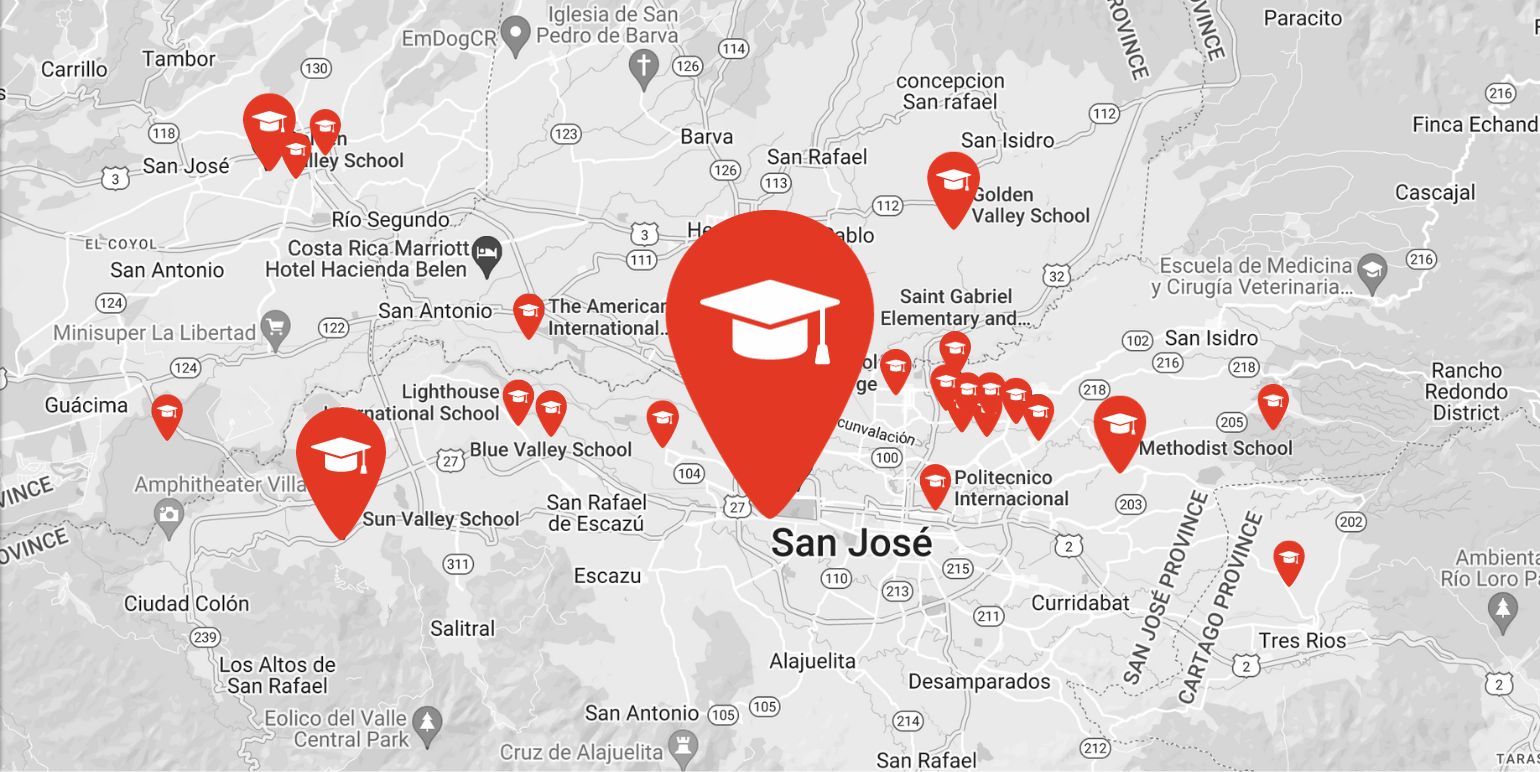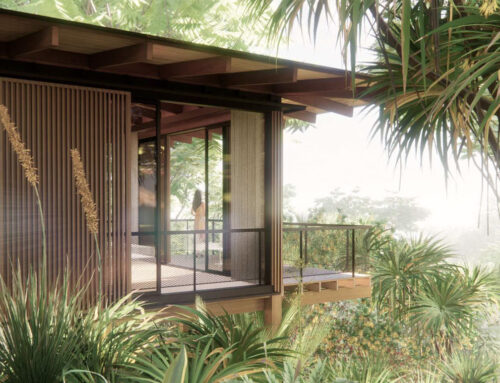Relocating to Costa Rica’s Central Valley as an expatriate family involves significant adjustments. Navigating the educational landscape in a new country can be daunting. However, expat families in Costa Rica’s Central Valley are fortunate to have access to a hub of academic excellence. The region boasts a wide array of institutions catering to different profiles of families with children, from early childhood to high school.
While it may be hard to make a decision about where to trust your child with, here’s an overview of the top private schools in Costa Rica, specifically in the Central Valley.

Private Schools by Educational Focus
English-Language Focused Education

Costa Rica’s Central Valley is home to several renowned international schools that prioritize providing high-quality education in English. However, these six private schools in Costa Rica not only prioritize English language education. They also offer a rich tapestry of experiences, ensuring holistic development and preparing students for a global future.
Although this is only a taste of the multiple institutions that exist in the country with this focus, families seeking a comprehensive and internationally-oriented education can consider these esteemed institutions in the heart of Costa Rica.
Christian-Inclined Education

Some esteemed private schools in Costa Rica provide education grounded in Christian principles. In general, these foster both academic excellence and spiritual growth. These offer not only rigorous academic programs but also a nurturing environment where students are encouraged to develop their spiritual identity, social conscience, and intellectual capabilities, preparing them to make meaningful contributions to society.
Families seeking a holistic education grounded in Christian values will find these schools to be exceptional choices for their children.
European-Based Programs

Costa Rica’s Central Valley is also home to several distinguished private schools in Costa Rica that offer European-inspired education. These aim to integrate language proficiency, cultural immersion, and academic excellence. Families seeking an international educational experience rooted in European principles will certainly find these institutions ideal for their children.
Here are four leading institutions that uphold European programs, providing students with a rich international experience for a successful future:
Private Schools by Area
While Costa Rica is divided into distinct regions like Central Valley East, Central Valley West, Alajuela and Heredia, it’s common for children to travel from one area to another to attend school. Despite the diverse locations, the distances between these regions are typically manageable, fostering a unique educational mosaic where families have the flexibility to choose schools based on their preferences rather than strict geographical constraints.
However, the landscape is not without its challenges; significant traffic congestion can pose a daily hurdle for students and parents alike. Navigating this intricate network of schools requires careful consideration of both location and transportation logistics, highlighting the importance of choosing a school that not only aligns with educational values but also offers a feasible and efficient commuting experience.

Central Valley West
With its charming towns and thriving communities, Central Valley West captures the essence of Costa Rican life, blending the tranquility of the countryside with the convenience of urban living. Here, educational institutions are not just places of learning but are harmoniously integrated into the natural beauty that defines the region. Families choosing Central Valley West for their children’s education are not only embracing academic opportunities but also immersing themselves in an environment where the wonders of nature enhance the educational journey, creating a unique and enriching experience for students and their families alike.
Some recognized institutions in the area are:
Central Valley East
Central Valley East serves as a hub for cultural richness and economic development, where historical landmarks intertwine seamlessly with modern amenities. This vibrant region encompasses a diverse tapestry of landscapes, from picturesque rural expanses to bustling urban centers. Amidst the rolling hills and lush greenery, you’ll find an array of charming towns and communities, each with its own unique character.
Home to a variety of educational institutions, this region offers families a wide spectrum of school choices, ranging from traditional institutions rooted in Costa Rican heritage to innovative, forward-thinking academies. As a pivotal part of the country, Central Valley East beckons with its warm hospitality, educational excellence, and a promising future, making it a compelling destination for families seeking a nurturing environment for their children’s education.
Some recognized institutions in the area are:
Heredia and Alajuela
Alajuela and Heredia, neighboring provinces in the heart of Costa Rica, jointly embody the essence of educational diversity and innovation. From the vibrant city life of Heredia to the tranquil countryside of Alajuela, families in these provinces are presented with a myriad of educational opportunities. Alajuela, often referred to as the “City of Mangos,” offers a unique blend of cultural heritage and academic vigor. Meanwhile, Heredia, known as the “City of Flowers,” boasts a rich history intertwined with cutting-edge educational institutions.
Together, these provinces provide a dynamic educational environment, with schools ranging from time-honored institutions that cherish Costa Rican traditions to progressive academies fostering innovation and global perspectives. Some recognized institutions in the area are:
Private School vs Public School in Costa Rica
Costa Rica has a strong public education system, but private schools are also popular with families who can afford them. The best way to decide which type of school is right for your family is to consider your individual needs and preferences. There are a number of factors to consider when choosing between the two, including cost, curriculum, class size, and extracurricular activities.
Cost

Public schools in Costa Rica are tuition-free, while private schools can be quite expensive. The cost of private school varies depending on the school’s location, size, and reputation. However, most private schools in Costa Rica charge tuition that is comparable to private schools in the United States.
Curriculum
Public schools in Costa Rica follow the national curriculum, which is set by the Ministry of Public Education (MEP). The curriculum is designed to prepare students for higher education and the workforce. Private schools in Costa Rica have more autonomy to develop their own curriculum, but they are still required to meet certain standards set by the MEP. Many private schools offer a more rigorous curriculum than public schools, including more advanced math and science classes, as well as foreign language classes.

Class size

Class sizes in public schools in Costa Rica can be large, with up to 40 students per class. Private schools in Costa Rica typically have smaller class sizes, with an average of 25 students per class. Smaller class sizes allow for more individual attention from teachers and a more interactive learning environment.
Extracurricular activities
Public schools in Costa Rica typically offer a limited number of extracurricular activities, such as sports teams and after-school clubs. Private schools in Costa Rica typically offer a wider range of extracurricular activities, such as sports teams, music programs, and arts programs. Extracurricular activities can help students to explore their interests and develop their talents.

Why Choose an International School in Costa Rica?
In Costa Rica, expats often find themselves debating between a predominantly Costa Rica-based curriculum or an international program. Each offers distinct advantages.
One of the primary reasons expatriate families lean towards international schools is the emphasis on residency and language. International schools cater to the expat community by providing a curriculum that accommodates students from various cultural backgrounds. This inclusivity ensures that expat children have the opportunity to mingle and learn alongside peers from diverse nationalities, enriching their overall learning experience.

Moreover, international schools prove to be an excellent choice for families planning a relatively short stay in Costa Rica. These schools offer a seamless transition for expat children, allowing them to continue their studies without interruptions. However, many discerning expatriates, including a significant number of LX clients, opt for international schools for long-term education.
One of the key advantages lies in the academic consistency international schools provide. These institutions adhere to globally recognized curricula, ensuring that your child’s education remains on par with international standards. This consistency becomes especially crucial if your family anticipates relocating frequently due to work or other commitments. Additionally, if you harbor ambitions of your child attending university abroad, an international school can be the ideal stepping stone.
Universities in Costa Rica
Costa Rica boasts a diverse array of private and public universities, offering students an opportunity to pursue higher education in the midst of a tropical paradise. One of the notable advantages of studying in Costa Rica is the comparatively affordable tuition fees. Unlike the steep costs associated with many U.S. colleges, the annual tuition fees at Costa Rican universities are typically half of what in-state students would pay in the United States.
While Spanish is the primary language in most Costa Rican universities, there is a growing availability of English-language programs. These programs extend beyond undergraduate studies, encompassing Master’s and Doctoral programs as well. For those more comfortable with English as their medium of learning, private universities in Costa Rica, such as Ulacit, offer a wide range of English-focused majors.

Costa Rica offers a diverse educational landscape that reaches far beyond the Central Valley. Notable institutions such as EARTH University and CATIE (Tropical Agricultural Research and Higher Education Center) provide specialized education in fields like sustainable agriculture and tropical agriculture. The country is also home to University for Peace, a UN-established institution dedicated to global peace and diplomacy. Furthermore, Costa Rica hosts satellite campuses of international universities like Texas Tech, offering American education in a culturally rich environment.
Studying in Costa Rica offers more than just academic enrichment. Surrounded by the lush beauty of tropical landscapes, students can immerse themselves in a vibrant cultural experience. This will enhance their personal growth and global perspective.
Top Public/Private Universities in Costa Rica:
We have explored the diverse top private schools in Costa Rica, specifically in the Central Valley. While we have highlighted a selection of institutions, it’s important to note that these are just a glimpse into the wealth of high-quality educational options available. Numerous other esteemed schools contribute significantly to the educational fabric of the region. Some of these are Saint Mary School, Mountain View School, West Land School, True North School, and Golden View School.
While searching for a luxury home, it’s crucial to recognize that the process transcends mere physical features and architectural design. In this process, understanding the family and educational context is crucial to ensure the flourishing of every family member.

It’s crucial to take aspects such as transportation, school schedules, and other logistical considerations into account. Additionally, contemplating the family’s interests and the children’s extracurricular activities is key. Whether it’s equestrian pursuits, golf, arts, music, or theater programs, these after-school activities contribute significantly to the family’s lifestyle. They should be seamlessly integrated into the decision-making process.
Overall, by comprehensively understanding the family’s dynamics and educational needs, prospective homeowners can make informed choices that will foster a harmonious living environment that aligns with the family’s unique aspirations. Additionally, by contacting one of our LX agents, you can get one-on-one guidance on schools around your home.








